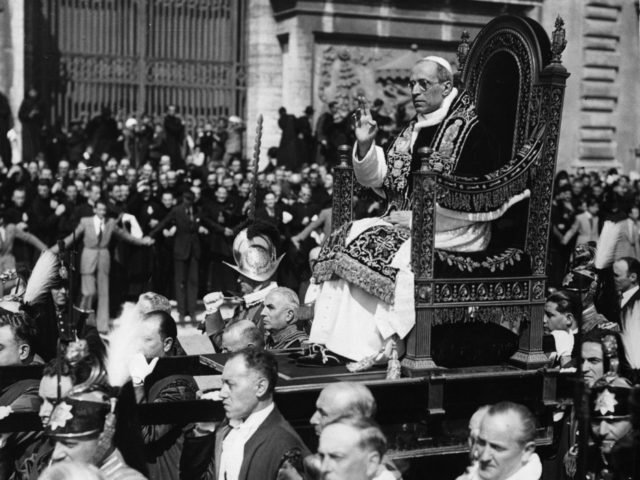Pope Francis announced Monday that the Vatican will open its archives on the pontificate of Pope Pius XII, which ran from 1939 until his death in 1958.
“I have assumed this decision after hearing the opinion of my closest collaborators, with a serene and confident mind, sure that serious and objective historical research will be able to evaluate, in the proper light and with appropriate criticism, the praiseworthy moments of the Pontiff and, without any doubt, also moments of serious difficulties, of tormented decisions, of human and Christian prudence,” the pope told officials of the Vatican Secret Archive.
To some, these decisions “might have seemed to be reticence,” Francis said, and instead “were attempts, humanly also very hard-fought, to keep the flame of humanitarian initiatives lit during periods of more intense darkness and cruelty, of hidden but active diplomacy, of hope in possible good openings of hearts.”
“The Church is not afraid of history; rather, she loves it, and would like to love it more and better, as God does! So, with the same trust of my predecessors, I open and entrust to researchers this documentary heritage,” he said.
Pope Pius XII, who was highly praised during his lifetime, fell under a pall of suspicion following the release of a 1963 propaganda play by Rolf Hochhuth titled The Deputy, “which bitterly caricatured Pius as silent and indifferent during the Holocaust.”
Extensive new studies have shown that the Catholic Church was one of the most active defenders of the Jews during the Second World War, saving hundreds of thousands. Vatican Radio itself, under the authority of Pius XII, “was among the first major voices to publicly condemn Nazi atrocities against Jews and Catholics in Poland, shortly after World War II began.”
Even the BBC found itself obliged to issue a correction in 2016, noting that an earlier report denouncing Pius “did not give due weight to public statements by successive Popes or the efforts made on the instructions of Pius XII to rescue Jews from Nazi persecution, and perpetuated a view which is at odds with the balance of evidence.”
Upon the death of Pope Pius XII, Israel’s foreign minister Golda Meir sent the following message:
We share in the grief of humanity. When fearful martyrdom came to our people in the decade of Nazi terror, the voice of the Pope was raised for its victims. The life of our times was enriched by a voice speaking out about great moral truths above the tumult of daily conflict. We mourn a great servant of peace.
Pope Francis said he wished to announce the opening of the archives now, because March 2 marked the 80th anniversary of the election of Pius XII.
Pope Pius “found himself guiding the Barque of Peter at one of the saddest and darkest moments of the twentieth century, agitated and lacerated by the last world war,” Francis said, while noting that some studies of the pontiff were undertaken “with some prejudice or exaggeration.”
“Today he has been appropriately re-evaluated and indeed placed in the correct light for his many qualities: pastoral, above all, but also theological, ascetic, and diplomatic,” Francis said.
Follow Thomas D. Williams on Twitter Follow @tdwilliamsrome

COMMENTS
Please let us know if you're having issues with commenting.